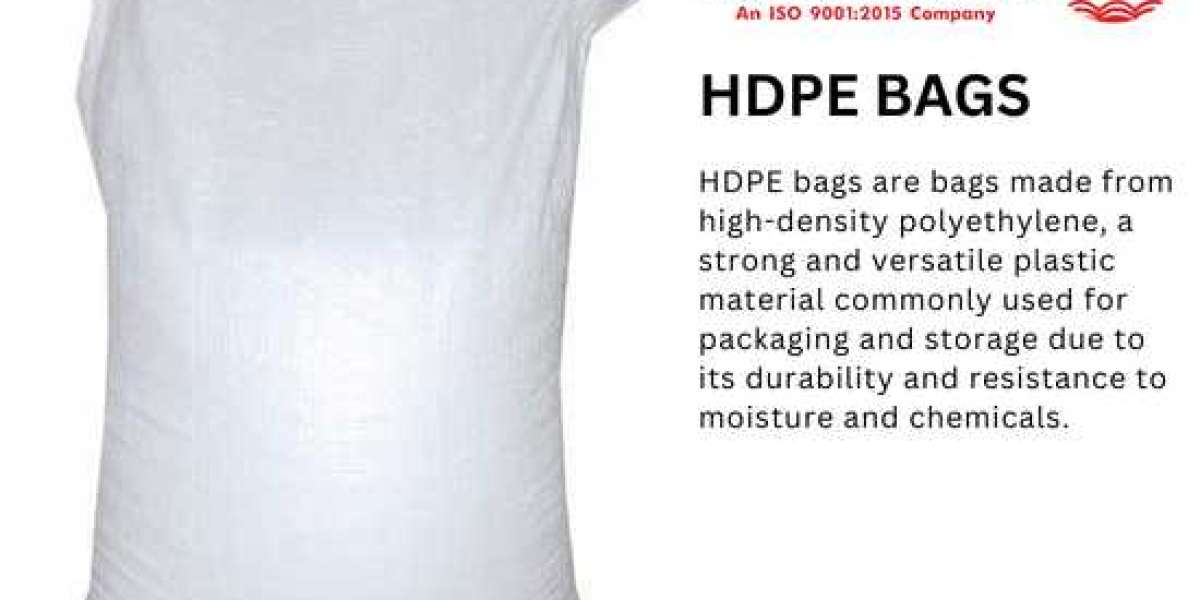In the world of packaging, HDPE Bag Suppliers in Gujarat stand out as versatile, durable, and eco-friendly solutions. High-Density Polyethylene (HDPE) bags have gained immense popularity across various industries due to their exceptional strength, flexibility, and recyclability. Whether you're a business owner, a consumer, or simply curious about sustainable packaging options, this comprehensive guide will walk you through everything you need to know about HDPE bags.
What are HDPE Bags?
HDPE bags are made from High-Density Polyethylene, a thermoplastic polymer renowned for its strength and durability. These bags are commonly used for packaging purposes due to their ability to withstand various environmental conditions, including moisture, chemicals, and extreme temperatures. HDPE bags come in different sizes, shapes, and thicknesses, catering to diverse packaging needs across industries.
Key Features of HDPE Bags:
Strength and Durability: HDPE Bags Exporters in Gujarat are exceptionally strong and durable, making them ideal for carrying heavy items without the risk of tearing or puncturing.
Versatility: These bags are versatile and can be used for packaging a wide range of products, including groceries, clothing, electronics, and industrial components.
Chemical Resistance: HDPE bags offer excellent resistance to chemicals, oils, and solvents, ensuring the integrity of packaged goods even in challenging environments.
Waterproof: One of the standout features of HDPE bags is their waterproof nature, which provides added protection to the contents from moisture and humidity.
Recyclability: HDPE is a recyclable material, making HDPE bags an eco-friendly packaging option that supports sustainability initiatives.
Applications of HDPE Bags:
Retail Packaging: HDPE Bags Manufacturing in Ahmedabad are widely used in retail stores for packaging groceries, clothing, toys, and other consumer goods. Their strength and versatility make them a preferred choice for both retailers and consumers.
Industrial Packaging: In industries such as agriculture, construction, and manufacturing, HDPE bags are used for packaging bulk materials like grains, chemicals, cement, and fertilizers. Their durability ensures safe transportation and storage of heavy-duty goods.
Hospitality Sector: HDPE bags find applications in the hospitality sector for packaging toiletries, linens, and other amenities offered to guests. Their waterproof nature adds an extra layer of protection, maintaining the quality of the contents.
Healthcare Industry: In the healthcare industry, HDPE bags are used for packaging medical supplies, pharmaceuticals, and biohazardous waste. Their chemical resistance and reliability are crucial for ensuring the safety and sterility of medical products.
Promotional Events: Businesses often use custom-printed HDPE bags as promotional giveaways during events, trade shows, and conferences. These bags serve as effective marketing tools while showcasing the company's commitment to sustainability.
Conclusion:
HDPE bags are indispensable packaging solutions known for their strength, durability, and eco-friendliness. Whether you're a retailer, manufacturer, or consumer, integrating HDPE bags into your packaging strategy can offer numerous benefits, from protecting your products to minimizing environmental impact. With their versatility and recyclability, HDPE bags continue to play a vital role in shaping the future of sustainable packaging.
Frequently Asked Questions (FAQs):
Q1: Are HDPE bags environmentally friendly?
A1: Yes, HDPE bags are considered environmentally friendly because they are made from recyclable materials. They can be recycled and reused, reducing the environmental impact associated with single-use plastics.
Q2: Can HDPE bags be used for food packaging?
A2: Absolutely! HDPE bags are safe for food packaging as they meet stringent regulatory standards for food contact materials. They are commonly used for packaging fruits, vegetables, meats, and other perishable items.
Q3: How can I recycle HDPE bags?
A3: Many municipalities offer recycling programs for HDPE bags. Simply collect your used bags and drop them off at designated recycling centers or look for recycling bins at grocery stores and retail outlets.
Q4: Are HDPE bags suitable for storing liquids?
A4: While HDPE bags are waterproof and resistant to moisture, they may not be the best option for storing liquids for an extended period. For liquids, consider using HDPE bottles or containers specifically designed for liquid storage.
Q5: Can HDPE bags be customized with logos or designs?
A5: Absolutely! HDPE bags can be customized with logos, designs, and branding elements to promote your business or event. Many manufacturers offer custom printing services to meet your specific requirements.







